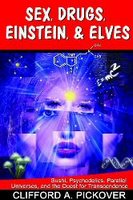Sunday, December 18, 2005
Can God seem cruel?
Does it bother you that both the Jewish and Christian God and his righteous followers sometime seem to have exhibited cruelty from both a historical and Biblical context? For example, God told Saul to attack the Amalekites and destroy them completely -- "men and women, children and infants, cattle and sheep...." God also tells us we must kill the disobedient child or the person who does not follow the Sabbath.
How do today's Protestants feel when they realize that Martin Luther said that the Jews are a "serpent's brood" and "one should burn down their synagogues and destroy them"? Why does St. Aquinas tell us we should kill people for errors in belief? Although the ten commandments forbid murder, the Old Testament appears to contain numerous murders by God or aided by God in which "innocent" women and children are killed. I discuss these matters further here, but how do you deal with such weighty and emotional topics?
How do today's Protestants feel when they realize that Martin Luther said that the Jews are a "serpent's brood" and "one should burn down their synagogues and destroy them"? Why does St. Aquinas tell us we should kill people for errors in belief? Although the ten commandments forbid murder, the Old Testament appears to contain numerous murders by God or aided by God in which "innocent" women and children are killed. I discuss these matters further here, but how do you deal with such weighty and emotional topics?
Comments:
<< Home
In a word, "Gnosticism".
The Problem of Evil conclusively refutes theism; the "God" of the Hebrews (and the Old Testament) cannot be the loving God of the Christian New Testament.
With a nod to Plato (and an apology to the Children of Israel), YHWH is nothing more than the Demiurge, an inferior, vain, and self-aggrandizing Creator who deludes himself into the notion that he is truly God.
Thus, nothing in the Old Testament is of value as spiritual truth; it's merely of passing historical interest, and Christians would do well to consign it to the theological dustbin where it belongs.
The Problem of Evil conclusively refutes theism; the "God" of the Hebrews (and the Old Testament) cannot be the loving God of the Christian New Testament.
With a nod to Plato (and an apology to the Children of Israel), YHWH is nothing more than the Demiurge, an inferior, vain, and self-aggrandizing Creator who deludes himself into the notion that he is truly God.
Thus, nothing in the Old Testament is of value as spiritual truth; it's merely of passing historical interest, and Christians would do well to consign it to the theological dustbin where it belongs.
Can God seem cruel? Yes. God can seem cruel. To quote Hamlet,
"I must be cruel only to be kind."
The issues are much more complicated than black and white, good and evil. Here are just a couple points:
• We live in changing times and changing cultures. Old testament times were extremely different. There was more overt violence than our sanitized culture. How many of us see the animals butchared that we eat? Back then, it was a family affair to butcher the animals. Not to mention it was a tribal atmosphere, might = right.
• If you think of the human race not as individual lives but as one giant organism that has been developing throughout the ages, and then compare that to how cancer works in the body, does it seem cruel to radiate and kill off cancer? Or should cancer be given 'equal rights' to take over the body? I'm not justifying any action, just trying to show it in a different light. The God of the OT, was a God dealing with a younger human race, where the smallest deviation from a starting point could easily spiral off into unknown destinations for His people, His bride. (I'm talking caos theory here)
The God of the NT is dealing with a human race that is devolping into adulthood and has a stronger 'immune system' to evil. Thus the introduction of Grace.
Just like the cancer example, when you kill off cancer, you kill off good cells with the bad cells. In the OT the human race could not cope with the cancer, and so the arm was taken off in order for the race to survive. In the NT, the human race as an entity has a stronger immune system and in order to preserve the good that would be destroyed with the evil, the evil is allowed to exist.
• The problem of Evil... how about the problem of choice. Evil is not the only question here, it is man's choice. If you would rather have a God that insists of beings loving him, then yes, there is a problem with how God can be good and evil exist. If you are dealing with a God who want's to be loved, not because people have to but because they want to and will insist on loving, then evil is... necessary.
"I must be cruel only to be kind."
The issues are much more complicated than black and white, good and evil. Here are just a couple points:
• We live in changing times and changing cultures. Old testament times were extremely different. There was more overt violence than our sanitized culture. How many of us see the animals butchared that we eat? Back then, it was a family affair to butcher the animals. Not to mention it was a tribal atmosphere, might = right.
• If you think of the human race not as individual lives but as one giant organism that has been developing throughout the ages, and then compare that to how cancer works in the body, does it seem cruel to radiate and kill off cancer? Or should cancer be given 'equal rights' to take over the body? I'm not justifying any action, just trying to show it in a different light. The God of the OT, was a God dealing with a younger human race, where the smallest deviation from a starting point could easily spiral off into unknown destinations for His people, His bride. (I'm talking caos theory here)
The God of the NT is dealing with a human race that is devolping into adulthood and has a stronger 'immune system' to evil. Thus the introduction of Grace.
Just like the cancer example, when you kill off cancer, you kill off good cells with the bad cells. In the OT the human race could not cope with the cancer, and so the arm was taken off in order for the race to survive. In the NT, the human race as an entity has a stronger immune system and in order to preserve the good that would be destroyed with the evil, the evil is allowed to exist.
• The problem of Evil... how about the problem of choice. Evil is not the only question here, it is man's choice. If you would rather have a God that insists of beings loving him, then yes, there is a problem with how God can be good and evil exist. If you are dealing with a God who want's to be loved, not because people have to but because they want to and will insist on loving, then evil is... necessary.
Evil is necessary only within the context of Man's onus to choose; it is inexcusable on (Theistic) God's part.
In addition, there is nothing logically inconsistent about an all-powerful Creator creating Mankind with Free Will in such a way that by coincidence, Man always happens to choose Good. And yet, neither Man nor "God" does so. Ipso, OT Creator "God" is not God.
Note that a Creator may considered logically necessary (The Cosmological Argument: if anything exists, and it does, then something much exist upon which all existing things, including itself, depend for their existence) to exist, but the logical existence of a Creator is by no means a successful refutation of the Problem of Evil nor a justification of theism.
In addition, there is nothing logically inconsistent about an all-powerful Creator creating Mankind with Free Will in such a way that by coincidence, Man always happens to choose Good. And yet, neither Man nor "God" does so. Ipso, OT Creator "God" is not God.
Note that a Creator may considered logically necessary (The Cosmological Argument: if anything exists, and it does, then something much exist upon which all existing things, including itself, depend for their existence) to exist, but the logical existence of a Creator is by no means a successful refutation of the Problem of Evil nor a justification of theism.
Who can truly know the mind of a wacky, wacky god? I am soothed by knowing god will reveal the punchline to me someday, and then I'll appreciate 'cruelty' for what it really is: slapstick comedy at such a refined level as I cannot hope to fathom in my current state of existence.
While I'm not an atheist, you must realize that unless you can somehow prove that these writings (any of them, take your pick) actually occurred then the simplest and most likely explanation is that it is the work of humans influencing/manipulating one another. Without a better way to explain the world around them, the most trivial of happenings must have seemed God-sent. Imagine Moses showing up today while we drive in our cars while talking on cell phones and surfing the internet on wireless cards in our laptops...it would all seem as if God were everywhere to an unassuming mind.
As to you who condemn one religion in support of your own...you are the very picture of hypocritical behavior. Thankfully, since you believe so heartily in Hell, you will most likely be the occupants. Turn the other cheek? My ass...if you practiced what you preached, you wouldn't make the comments that you make. Be content with what you believe in and stop trying to make others see through your eyes. I know God and it doesn't like your kind of behavior.
As to you who condemn one religion in support of your own...you are the very picture of hypocritical behavior. Thankfully, since you believe so heartily in Hell, you will most likely be the occupants. Turn the other cheek? My ass...if you practiced what you preached, you wouldn't make the comments that you make. Be content with what you believe in and stop trying to make others see through your eyes. I know God and it doesn't like your kind of behavior.
Do you think h5n1 flu is going to be a problem ?
I heard it would hit USA & Canada this fall.
Is there anything to the h5n1 flu panic ?
I heard it would hit USA & Canada this fall.
Is there anything to the h5n1 flu panic ?
The part in the Torah about killing disobediant children was NOT a commandmnent but a nominal element of the Law .
Furthermore, the text seems to suggest that not each and every disobediance warranted killing the children but refers to drunkard activity and would mostly likely involve riotous living .
jay at mudstones2@aol.com
Post a Comment
Furthermore, the text seems to suggest that not each and every disobediance warranted killing the children but refers to drunkard activity and would mostly likely involve riotous living .
jay at mudstones2@aol.com
<< Home
 Godlorica
Godlorica



























